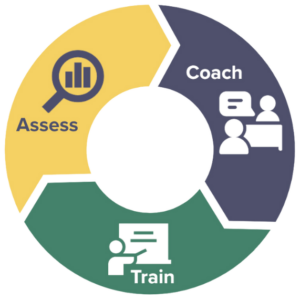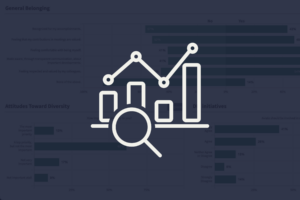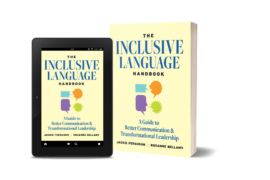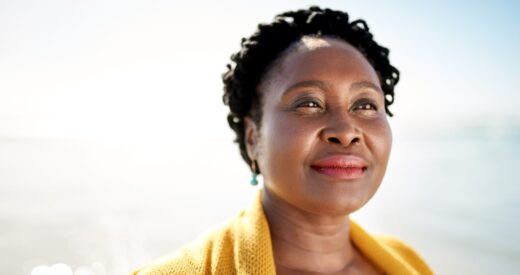This is the first blog in a 3-part series.
As I write this, I find myself halfway through my fiftieth trip around the sun.. The year of turning fifty is a reflective time for many people, and I know I am not unique in my introspection. The past three decades — the full span of my adult life — have left me feeling little connection to where I was born and raised and to who I was during that time. In truth, I spent my first twenty years NOT growing into the man I was meant to be.
So, how does one travel from a dorm room at Ole Miss, festooned with a five-foot Confederate flag, to a multicultural neighborhood in Charlotte, selected in part because of its diversity of schools that will well-serve your bi-racial (Black and White) child? For some of us born in Generation X and earlier, that’s a long, complicated trip.
As I reflect on the journey of my life thus far, Dr. King’s metaphor of the long arc of history ever bending toward moral justice resonates with me now more than ever. I know, because it has been bending me, too.
As a White man who grew up in the South and, while doing so, embraced all of the worst aspects of this complex region, I’ve moved from my birthright of representing the majority, in every way I could, to seeing the world through the eyes of my multiracial son. At age three, that’s as sweet and soulful a view as you’ll ever see, but I try to look through his eyes in the all-too-near future, wondering when he will cross the line from being seen as another cute baby to a being seen as a lingering threat.
In recent years, as he has come into my family, I’ve crossed that bridge from hard-won empathy to sympathy. While I am not Black myself, I feel a kinship with Black parents, and Black fathers especially, and I’m hoping and praying with all of my heart that Dr. King’s long arc gets a hell of a lot shorter and bends a hell of a lot faster than it has in the past, so that mothers and fathers of this generation don’t experience the same living hell as the parents of so many other Black children. Emmett. Trayvon. Ahmaud. All. Those. Children.
Growing up racist in the Confederate South
I grew up in Mississippi in the 1970s and 80s, leaving in the early 90s for North Carolina. We were taught all manner of Lost Cause mythology. Jefferson Davis, a Mississippian and President of the Confederacy, was revered, as was of course, Robert E. Lee, and all the others memorialized by Daughters of the Confederacy statues around the country during the Jim Crow era. We were taught that enslaved people loved slavery because they didn’t have the mental faculties to thrive on their own and thus felt endebted and loyal to their enslavers.
The glorification of these crimes against humanity goes a long way to explaining the casual, jolting racism I witnessed (and participated in) on a daily basis. There was simply no doubt that if you were White, male, straight, and evangelical, you had inherited the earth, or at least that hot and humid corner of it. If you were Black and achieved any success, you were “one of the good ones.”
Yet, I both grew up with Black friends and shared many meals with them in my parents’ home.
The opposite of Pride
There were virtually no out people on the LGBTQ+ spectrum, much less people who were out and proud, and still less who were out, proud, and loved.
In fact, while I personally knew and intersected with people commonly thought to be gay, the only out person I can remember during that time was a gay rights activist named Eddie Sandifer, founder of the Mississippi Gay Alliance. What we were taught with regard to LGBTQ+ individuals usually involved an especially harsh combination of prejudices stemming from the prevailing religious views and mores of the region at the time. It was the opposite of pride, to say the least.
Proximity breeds empathy
I think the term “woke” comes from a pretty good place: it’s like waking up in the morning. Each day, as we open our eyes and adjust, we become more alert to our surroundings with each passing second, minute, and hour. Like many, I take a bold leap toward “awakeness” with that first cup of coffee, and my personal story of being “woke” feels so similar to that morning process.
I look at my journey as one of awakening, especially as an adult — one through which I have shed many of the beliefs I held true and was taught to believe as a child. The more I am awakened, the more alert I become to the need for still more awakening, watchfulness, and growth.
I have some beautiful people in my life. They were born into the truth, and their hearts have always been largely pure. I, on the other hand, was born with a mind tangled in a collection of half-truths, omissions, and outright lies. Since I’m nearly fifty, please remember that when I was born the long arc hadn’t yet bent so well then as it has bent and is bending now.
Thank you to the people who keep waking me up
I’m grateful to those who nudged me awake at key moments of my slumbering journey through life. You’ll hear about these people — my first Black supervisors and first gay friends at work, lesbian and transgender leaders in faith communities, as well as educators and historians who began unraveling all of those lies. These gifts in my life have changed my worldview and my mindset; they’ve challenged me to look at my past for helpful lessons, to experience the present with eyes wide open, and to accept the challenge and play my part in creating that better, fairer future for all.
Speaking of gifts, in addition to my son, my greatest gift of all is my wife. Fiercely independent, she began questioning many of the same beliefs and teachings that I did at an earlier age. While I’ve had to be nudged and scolded at times (and at times, by her) to grab that empathy and awaken, she has a built-in sense of siding with the truth . She’s the woman who befriends and loves all: seemingly custom-made to raise our son and serve as my moral compass along that coparenting journey.
Throughout history, White people like us have co-authored chapters in the story of equality and equity. We stand on the shoulders of these particular giants, such as the early Abolitionists, who existed contemporaneously with those people so often excused by “being of their time and place.”
This is the beginning
If we are going to be better at home, at work, and in society, getting better starts with us, not with people who are marginalized. Throughout the next months, I’ll be sharing more stories from my personal journey. I hope you’ll join me for the ride, where I’ll prove to you that, while change takes time, it really can happen. For me, it happened — and keeps happening — because the people who kept poking me awake also kept choosing never to give up on me. They invested in me. They had those tough conversations, and they chose to make those hard investments because they believed the cause was worth it.
There are reasons why White people — especially White men — recoil at the notion of diversity training and completely melt down over efforts like The 1619 Project. For many, it’s that sense that if they are being called to account: that they must cede ground which they’ve worked hard to gain. For others, it’s a matter of shame and embarrassment. And for others still, it’s down to years and years of programming. From school, from church, from parents, from grandparents.
I’ll close with an explanation of that last point. Like many children, I grew up idolizing my grandfather. At seventeen, he lied about his age to join others from the Greatest Generation to defend American freedom in World War II. He came home, met my grandmother while stationed in my hometown of Jackson, and raised three beautiful children, including my mom, in a house he built in a neighborhood set aside for veterans (called the GI Section).
He had a soft spot for me, as my father died when I was still a baby. Sadly, he passed away when I was eleven. Years later, I found out that he was so incensed at the integration of our beloved university, Ole Miss, that he spoke with others about standing with locked arms at the enrollment site.
These men were church deacons and Sunday School teachers, school principals, police officers and firefighters, lawyers, and doctors. When the public schools integrated less than five years after the flagship university (both forced by the federal government), these men, through their civic organizations known as White Citizens Councils and through their churches and country clubs, formed a large network of all-White segregation academies, seemingly overnight.
From one school year to the next, all-White public schools became nearly all-Black. I attended a segregation academy for three years. There, I was taught in ninth-grade Mississippi history class not about the horrors of slavery, the evils of Jim Crow, nor the Civil Rights Movement, but concepts like the “War for Southern Independence” and the bane of Reconstruction by the Radical Republicans who had taken over Congress.
I give you all of this background in order to challenge your consideration — those of you who may have given up on all of us older, heterosexual, cisgender, White men, we come from certain times and places, but like all of those right-place, right-time allies throughout history, we are also capable of growing and effecting change.
Earlier, I asked, how did I get here? An ally, friend, and now family member to people of color and people who identify as LGBTQ+ has emerged from someone born of virtually every bigotry. Stay with me, and I’ll share those people and events who shaped me and continue to challenge me to shape myself into a better person.
Read the second part in this series here.
Brian Castle is the Founder & CEO of Parklife Communications, a full-service content shop serving small and mid-sized companies and larger agencies with a digital marketing focus. Brian is passionate about collaborating with executives and entrepreneurs to help tell their stories to effect positive change.














